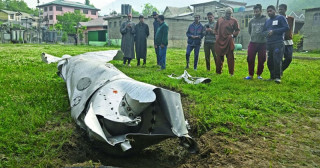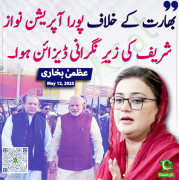Re: Off The Record - 14th November 2011 - Zulfiqar Mirza, Hanif Abbasi & Faisal Raza Abidi - Zardari Go!!!
[TABLE="align: center"]
[TR="class: large_txt"]
[TD]Citibank, Swiss official have admitted Zardari had dollar accounts [/TD]
[/TR]
[TR]
[TD="class: small_txt"][/TD]
[/TR]
[TR]
[TD="class: small_txt"]By Ahmad Noorani[/TD]
[/TR]
[TR]
[TD="class: small_txt"] [/TD]
[/TR]
[TR]
[TD="class: small_txt"] ISLAMABAD: Law Minister Babar Awan’s two major arguments that $60 million Swiss accounts allegation is hypothetical and investigations in Switzerland were unilateral are in complete contradiction to his own previous statements, as well statements of top PPP leaders, spokesmen for the present PPP government, Swiss officials and of the Swiss bank.
As the existence of $60 million Swiss accounts in the name of Asif Ali Zardari is concerned, the following is the official statement of Daniel Zappelli, Swiss chief prosecutor, made on August 26, 2008 to the media, as reported by the official website of Reuters: “Pakistan’s government recently dropped out of all related cases it had initiated in Switzerland against Asif Ali Zardari. Zappelli said the full $60 million in assets, seized at the request of the Pakistan authorities, had been released”.
“All the money has been unfrozen. For money-laundering to be proven, you have to show it was the product of a crime,” Zappelli told Reuters, adding: “Pakistan has withdrawn its requests for judicial assistance and has said it has no claim on the frozen assets,” he said.
The very next day to these happenings in Geneva, the spokesperson of the government in Islamabad Sherry Rehman officially admitted that there were cases against Zardari and that he possesses certain assets and accounts there. Her statement, she made publicly in front of video cameras of different TV channels, is in conflict with today’s statement of Babar Awan and his present statements which gave an impression that in fact neither there were any cases against Zardari in Switzerland nor were there any ceased or frozen assets in his (Zardari’s) name which later were unfrozen.
While Zappelli stated in Geneva on Aug 26, 2008 that cases against Zardari had been dropped and accounts of $60 million were unfrozen, Sherry in Islamabad stated on Aug 27, 2008 after attending an important cabinet meeting that Swiss courts have not only closed the cases against Zardari and exonerated him but have also released his assets and unfrozen his accounts which proves that Mr Zardari was innocent. Babar Awan forget to explain as towards which accounts and assets in Switzerland, Mr Zappelli and Ms Sherry were pointing out in their official statements in the last week of August 2008.
Babar Awan has once himself informed this correspondent about Benazir Bhutto’s appearances in Switzerland courts to face the allegations of money laundering and record her statements so it was very hard to understand that why Babar Awan on Tuesday said that investigations in Switzerland were unilateral.
Citibank itself had submitted evidence in the US Congressional Committee on Money Laundering in 1999 that the amount belonged to Asif Ali Zardari.
Citibank informed the Subcommittee that the Swiss Form A, a government-required beneficial owner identification form, identified Mr Zardari as the beneficial owner of each PIC, which had this money in the bank.
Mr Rukavina, then head of the Citibank private bank, told the US Subcommittee staff that when he was asked about opening the Zardari accounts, he did not make the decision to open them, but rather directed that the matter be discussed with Mr Sharma.
Citibank informed the subcommittee staff that the private bank was aware of the allegations of corruption against Mr Zardari at the time it opened the accounts in Switzerland. However, Citibank reasoned that if the charges for which Mr Zardari had been incarcerated for two years had any merit, they would not have been dropped. Bank officials also believed that the family wealth of Ms Bhutto and Mr Zardari was large enough to support a large private bank account, even though Citibank was not able to specify what actions were taken to verify the amount and source of their wealth.
Citibank said bank officials were also aware of the MS Capricorn Trading account in Dubai, and they were comforted by the fact that there had been no problems with that account. According to Citibank, Mr Amouzegar informed his superiors that Mr Zardari was the beneficial owner of the Capricorn account in Dubai when they were considering the request to open the accounts in Switzerland.
Inexplicably, however, the Dubai account manager was apparently still operating under the assumption that the beneficial owner of the Dubai Capricorn account was a member of the Dubai royal family. Subcommittee staff has been unable to determine whether Citibank officials were unaware of or inattentive to the serious inconsistency between Citibank Switzerland and Citibank Dubai with respect to the Capricorn Trading account.
Citibank also informed the subcommittee staff that bank officials had some concerns that if they turned down the accounts, their actions may have implications for the corporation’s operations in Pakistan; however, they said they never received any threats on that issue.
Citibank told the subcommittee staff that the private bank decided to allow Mr Schlegelmilch to open the three accounts for Mr Zardari on the condition that the private bank would not be the primary accounts for Mr Zardari’s assets and the accounts and transaction restrictions requiring the accounts to function as passive, stable investments, without multiple transactions or funding pass-throughs.
None of the Citibank personnel interviewed by the subcommittee staff could identify any other private bank account with these types of restrictions. Other private banks interviewed by the subcommittee staff were asked if they had ever accepted a client on the condition that certain restrictions be imposed on the account. The all banks said they had not. One bank representative explained that if the bank felt that it needed to place restrictions on the client’s account, it didn’t want that type of client.
The existence of the restrictions are in themselves proof of the private bank’s awareness of Mr Zardari’s poor reputation and concerns regarding the sources of his wealth.
Citibank told the subcommittee staff that, once opened, only three deposits were made into the MS Capricorn Trading account in Dubai. Two deposits, totalling $10 million were made into the account almost immediately after it was opened. Citibank records show that one $5 million deposit was made on October 5, 1994, and another was made on October 6, 1994. The source of both deposits was ARY International Exchange, a company owned by Abdul Razzak Yaqub, a Pakistani gold bullion trader living in Dubai. Mr Razzak denies, however, making any payments to Mr Zardari.
Citibank could not explain the two $5 million payments. Ms Bhutto told the subcommittee staff that since ARY International Exchange is a foreign exchange business, the payments did not necessarily come from Mr Razzak, but could have come from a third party who was merely making use of ARY’s exchange services.
Citibank told the subcommittee staff that Mr Holderbeke signed a memo delineating the restrictions placed on the accounts, including a $40 million aggregate limit on the size of the three accounts, and transaction restrictions requiring the accounts to function as passive, stable investments, without multiple transactions or funding pass-throughs.
On December 5, 1997, Citibank prepared a Suspicious Activity Report on the Zardari accounts and filed it with the Financial Crimes Enforcement Network at the US Department of Treasury. The filing was made 14 months after its decision to close the Zardari accounts; 13 months after Mr Zardari was arrested a second time for corruption in November 1996, and nearly two months after the Swiss government had ordered four Swiss banks (including Citibank Switzerland) to freeze all Zardari accounts.
In June 1998, Switzerland indicted Mr Schlegelmilch and two Swiss businessmen, the former senior executive vice president of SGS and the managing director of Cotecna, for money laundering in connection with kickbacks paid by the Swiss companies for the award of a government contract by Pakistan. In July 1998, Mr Zardari was indicted for violation of Swiss money laundering law in connection with the same incident. Ms Bhutto was indicted in Switzerland for the same offence in August 1998.
[/TD]
[/TR]
[/TABLE]
Source
http://e.thenews.com.pk/tp_details.asp?id=29112







































